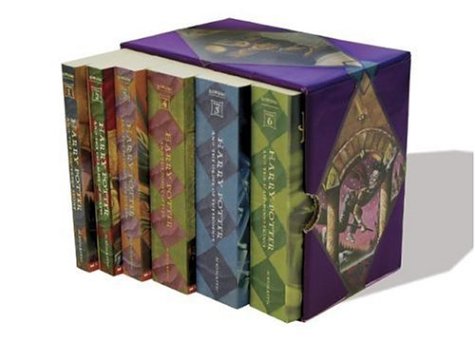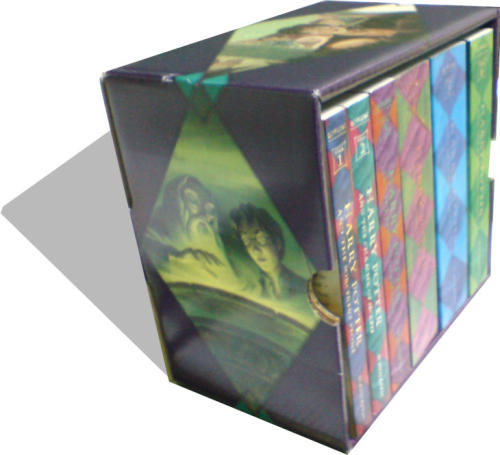Harry Potter Book Set



Harry Potter Book Set
Books 1 and 2 are kids' books--smart, exciting and captivating kids' books, but no more than that. Nowadays it seems fashionable to call them the "worst" of the series. But to get so popular, they had to have done something right--and they did, creating a detailed and appealing world. Every kid wants to discover that he is special, that the people he lives with are not his true family, and his real parents were famous and heroic--every kid wants to go to wizard school! Rowling enhances the experience with a wealth of details--names of spells, shops, famous wizards. (In all this, I agree with A.S. Byatt, though unlike her, I can't see why it's so terrible.) As a precocious 11-year-old, I got a kick out of Rowling's witty allusions, such as an intelligent woman named "Minerva." The adventures are suspenseful, even if in Book 1 the words "Sorcerer's Stone" aren't mentioned till page 219 of a 309-page book, and Book 2 takes too long rehashing Harry's situation for people who haven't read the first book. I still think Book 2 is pretty weak, what with the unspeakably annoying house-elf Dobby, the lurid monster-movie tone, and Hermione out of order during the climax. Still, by this point, Rowling has begun to demonstrate her gift for characterization. Gilderoy Lockhart is a hoot, Dumbledore's nutty sense of humor subverts and humanizes the archetypal "wise old wizard," and we've become attached to Harry, Ron, Hermione, Hagrid...
Luckily, when I first read the series, I didn't have much time to reflect on how bad Book 2 was, since Book 3 came out a few months later, and everything became much more expansive, and much better. Harry Potter and the Prisoner of Azkaban is just a great novel: longer than the first two books but not over-stuffed, consistently suspenseful and well-plotted (the Time-Turner climax is smart and thrilling), darker in tone but still with good jokes. Most importantly, it adds a new note of ambivalence into the series. Books 1 and 2 end with unequivocal triumphs for Harry. In book 3, he triumphs in rescuing Sirius and Buckbeak, but fails to prevent Peter Pettigrew's escape. This event (and his earlier decision to save Peter's life rather than letting Sirius kill him) is literally the turning point of the series. Had Peter not escaped, Voldemort might never have risen again, and certainly not in the same way, at the same time.
For the first time in Prisoner of Azkaban, we meet Harry's parents' friends, which adds a multi-generational component to the saga. And the adult characters are more complex than ever before, which makes the climax so intriguing (despite the fact that Voldemort doesn't make a personal appearance, as he does in Books 1 and 2). Lupin is a genuinely kind and talented professor, but also a werewolf; Sirius is not a vicious murderer, but a persecuted innocent--and yet he is still vengeful and half-crazed from his time in Azkaban; Harry's dad and his friends were the coolest guys in school, but played vicious pranks on Snape; Snape's dislike of Harry now makes a little more sense, and he actually seems to have Harry's well-being in mind, trying to protect him from Sirius. And Ron's rat is actually an Animagus, Muggle-killer, Voldemort's most loyal servant, and a cringing coward! Even Voldemort becomes a bit more than a cartoonish Evil Guy: we see that he and his followers are capable of betraying old friends, killing Muggles cavalierly, blaming the innocent. And the dementors are scarier than the basilisk ever was. Byatt writes that "nobody is trying to save or destroy anything beyond Harry Potter and his friends and family," and maybe that was true in the first 2 books, but with Book 3, Harry's (and Rowling's) world starts to balloon out.
I read Book 4 (Goblet of Fire) when I was 13, at summer camp. I'll never forget being two chapters from the end when one of the counselors came into my room and told me to turn my light off, as it was way past bedtime! Nor will I forget being one of eight girls sprawled in one room as the sun set, all reading Harry Potter. Goblet of Fire is another great achievement. It provides some of my favorite set-pieces: the Quidditch World Cup, Triwizard Tournament, Rita Skeeter's interviews, the Yule Ball. (Soon I'm gonna do a post about Hermione Granger's finest moments, including the Ball and surrounding events. I have to--she's a smart-girl icon!) It is maybe a little long, and the explanation (Barty Crouch Jr. disguised as Moody) a little convoluted, but the shift to a darker tone is handled well (set up by Book 3), and you sense J.K. Rowling's grand design, as she brings back elements from earlier books. Who knew that Harry and Voldemort’s wands having the same core would be that important? Along with Book 3, Book 4 feels like the heart of the series.
Someone once told me that the way children's brains process books is very different from the way adults process them, and the dividing line comes at age 13. That's certainly true with me and Harry. By the time Order of the Phoenix came out, I was 16, I hadn't read a fantasy book in years, I was curious about Harry's fate but no longer consumed by it. And the first time I read Order of the Phoenix, I really didn't like it. So long (they made the margins smaller to fit more in, and it's still the longest book!), with Harry acting like a pissy adolescent for the duration. However, I've reread it twice, and each time I like it more. It makes sense for Harry to be moody--he's spent four books acting like an archetypal hero, well-adjusted and mature for his age, but anyone would snap after what he's been through. Moreover, I LOVE the continuation of the moral ambiguity: it's not just good vs. evil in this book, it's good vs. evil vs. fear and apathy (represented by the Ministry of Magic). The idea that bureaucratic incompetence, denial, and narrow-mindedness can be just as damaging as pure malicious evil is quite sophisticated. Umbridge is so deliciously loathsome, like something out of Dickens, and you cheer for Dumbledore’s Army against her.
As it stands now, Half-Blood Prince is my least favorite book. I don't have fond childhood memories of it, as I do of Books 1 and 2--and besides, those books at least work as children's literature, while I'm not sure Half-Blood Prince works at all. It has the weakest suspense plot of any book—the question of “What is Draco up to?” never gets significantly developed. In all of the other books, Harry finds clues that only make sense after the fact (e.g. he thinks Ginny’s behaving strangely in Book 2 because she has a crush on him, but really it’s because she’s possessed by Voldemort), but Half-Blood Prince doesn’t tie together so cleverly. Mainly, it's a conduit for information that will become important in the last book: Voldemort’s past, the Horcruxes, the budding romances, and whether Snape is good or evil. It’s a series of scenes rather than a complete plot. The last 100 pages are very fine, exciting, painful and sad, but the book takes too long getting there.
Fortunately, Deathly Hallows is one sustained burst of excitement. If the previous 6 books were school stories (and derive much of their appeal from that), this is a man-on-the-run story. It’s Harry Potter crossed with North by Northwest, very cinematic--Rowling's time dealing with the movie industry has been well spent. Book 6 suggests that she was getting a little sick of Hogwarts, so Book 7 solves that problem by taking place in Gringotts, the Ministry, Godric’s Hollow... And I was worried when Rowling introduced the important magical concept of Horcruxes halfway through the sixth book—such a big quest! So many to find and only one book left to do it!—but the pacing of Deathly Hallows is quite excellent. It also takes on the most mythic resonances of all the books, with its quest plot, three questers, three Hallows, retelling of a fairy tale, and the hero’s death and rebirth. And it’s great that Rowling found a way for Voldemort to get defeated, once again, by “Expelliarmus.” Rowling is obviously working hard to make her moral points—what with the Christian themes, Snape’s redemption, and the fact that Harry never kills—but it’s still satisfactory. She may be gunning for literary legitimacy by giving Deathly Hallows epigraphs from Aeschylus and William Penn, but the true epigraph of the whole series is that line from Oscar Wilde’s Salome: “The mystery of love is greater than the mystery of death.”


No comments:
Post a Comment
Dear Visitor,
Please feel free to give your comment. Which picture is the best?
Thanks for your comment.